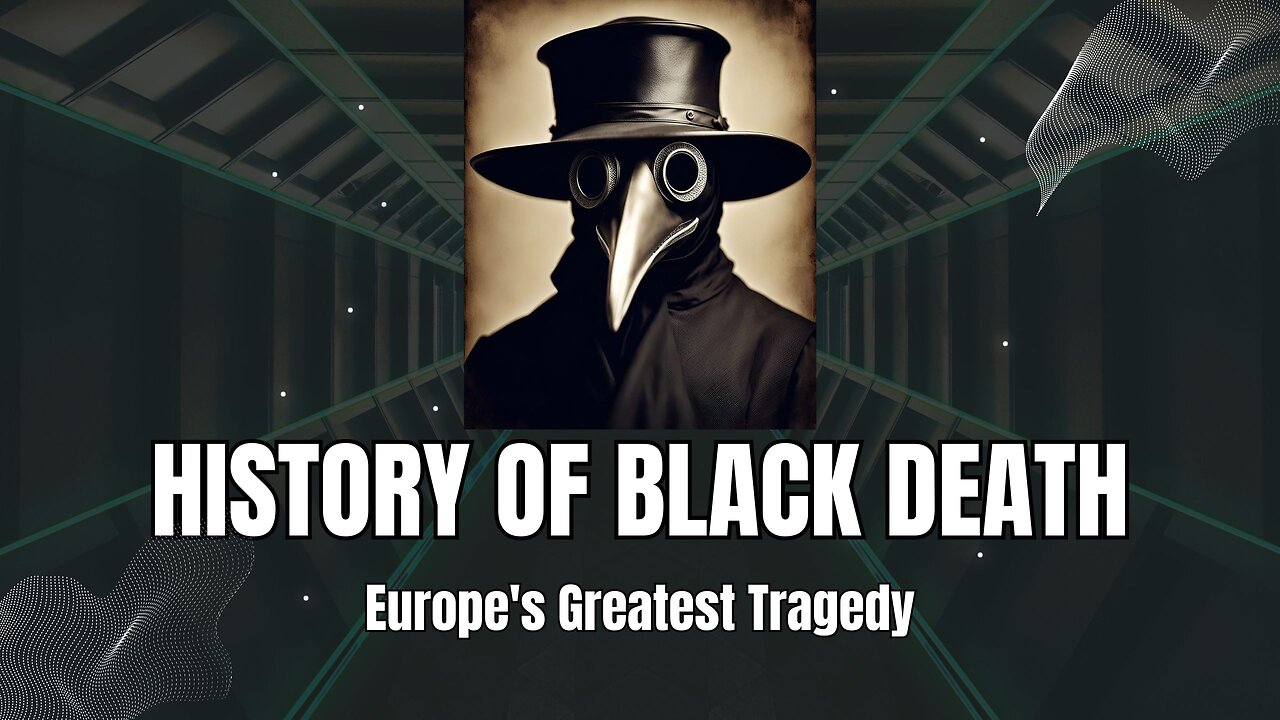Premium Only Content

History of the Black Death CC
The Black Death, also known as the Bubonic Plague, was one of the deadliest pandemics in human history. It struck Europe in the 14th century, killing millions and changing the course of history. Understanding this tragic event helps us appreciate modern advancements in medicine and public health.
The Black Death started in Asia and spread to Europe through trade routes. It reached Europe in 1347, arriving in Sicily via trading ships. From there, it quickly spread across the continent. The plague was caused by the bacterium Yersinia pestis, which was transmitted through fleas that lived on rats. As trade and travel increased, so did the spread of the disease.
Symptoms of the Black Death included fever, chills, vomiting, diarrhea, terrible aches, and swollen lymph nodes called buboes, which is why it was called the Bubonic Plague. The disease was extremely deadly, killing up to 60% of its victims within days.
The impact was devastating. Towns and cities were left with few survivors. Farms were abandoned, and food production dropped, leading to widespread hunger. The massive death toll caused labor shortages, which changed the economy and society. Many people began to question their beliefs and the authority of the Church, which couldn't stop the plague.
People tried various methods to stop the plague, from religious processions and prayer to more practical approaches like quarantines. Infected houses were sealed, and ships were isolated in ports. While these measures helped a bit, they were not enough to stop the plague.
The Black Death had lasting consequences. It led to changes in the economy, with labor becoming more valuable. This shift eventually contributed to the end of feudalism and the beginning of the Renaissance. The plague also prompted advances in medicine and public health as people sought to understand and prevent such diseases.
Today, we know much more about the Black Death. Scientists have studied ancient DNA to confirm that Yersinia pestis caused the pandemic. Modern medicine has developed antibiotics to treat the plague, making it much less deadly if caught early.
Understanding the history of the Black Death reminds us of the importance of disease prevention and the progress we've made in medicine. It also shows how human societies can change and adapt in the face of tragedy.
The Black Death was a catastrophic event that reshaped Europe in many ways. By studying this part of history, we learn about the resilience of human societies and the importance of advancements in health and medicine. Remembering the Black Death helps us appreciate the progress we've made and the importance of staying vigilant against diseases today.
If you found this video informative, please like, subscribe, and hit the bell icon for more historical insights. Share your thoughts in the comments below!
-
 LIVE
LIVE
Barry Cunningham
3 hours agoBREAKING NEWS: PRESIDENT TRUMP SAYS HE MAY INVOKE THE INSURRECTION ACT! AND NOW WE KNOW WHY!
2,293 watching -
 LIVE
LIVE
Dr Disrespect
10 hours ago🔴LIVE - DR DISRESPECT - BLACK OPS 7 - GIVE ME BACK MY NUKE
920 watching -
 LIVE
LIVE
Drew Hernandez
41 minutes agoTARGETED LEFTIST TERRORIST ATTACK IN CHICAGO & ISRAEL GEOFENCING U.S. MEGA CHURCHES
450 watching -
 1:32:30
1:32:30
Glenn Greenwald
7 hours agoWill the War in Gaza Finally End? Flotilla Activists Predictably Abused in Israel's Dungeons; Van Jones' Revealing Joke about "Dead Gazan Babies" | SYSTEM UPDATE #527
75.4K49 -
 LIVE
LIVE
SpartakusLIVE
3 hours ago#1 King of Content brings MOTIVATION to the MASSES on Monday
198 watching -
 LIVE
LIVE
megimu32
1 hour agoON THE SUBJECT: 2000s Hits That Vanished! 🎶
63 watching -
 12:19
12:19
China Uncensored
9 hours agoWas This Death China's Turning Point?
1.32K29 -
 LIVE
LIVE
This is the Ray Gaming
1 hour agoThe MonRAYest MonRay | Rumble Premium Creator
26 watching -
 LIVE
LIVE
GritsGG
6 hours agoWarzone Win Grinding! Most Wins in WORLD! 3680+!
20 watching -
 LIVE
LIVE
Flyover Conservatives
9 hours agoDinesh D’Souza on Dragon’s Prophecy, Israel War, & What’s Coming Next | FOC Show
219 watching
